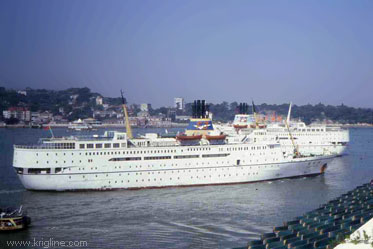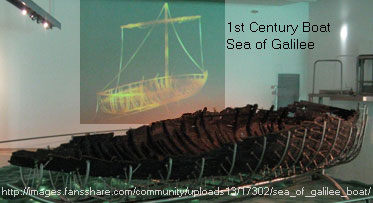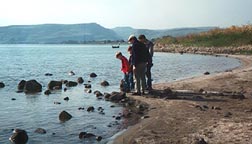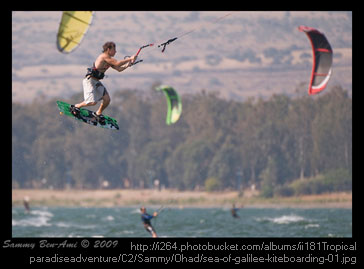(continued from other column)
“Peace,
be still! Why are you so fearful? Where is your faith?”
(Mark 4:39-40; Luke 8:25)
Did Jesus
actually expect them to rebuke the winds? It sure sounds
like it. [‘Do I have to do everything? Where is your
faith?’]
Or was it
more like [‘Where is your faith? In this little boat?
In your skill as fishermen? Don’t you understand yet that
the Father would not let the Messiah drown, and therefore you are
safe as long as you are with Me?’]
“Peace, be still! Where is your
faith?” That is not what I would have
expected. Nor did the disciples, because their jaws dropped,
and (according to Mark 4:41 CEV) “now they were more afraid than
ever and said to each other, ‘Who is this? Even the wind
and the waves obey Him!’”
Now, as
if that weren’t enough for one day, one more surprise (number
five) awaits us on the other side of the Lake. However,
I don’t think the demon-possessed people waiting for them were a
surprise to Jesus. I think the Holy Spirit told Jesus to go
deliver these guys, and that’s why (even after such a long day)
Jesus “gave a command to depart to the other side.” (Matt 8:18
NKJV)
We don’t
really have time to go through this, but in summary two
demon-possessed men immediately met them when the boat
arrived (one of them particularly violent and memorable). The
descriptions show they were quite a mess: crying out night and day
among the tombs, gashing themselves, naked, able to break chains,
and so exceedingly violent that no one could pass by that road.
(Matt 8, Mark 5, Luke 8). The unclean spirits recognized Jesus and
begged not to be disembodied, and Jesus (rather amazingly) grants
their request to transfer to a nearby heard of pigs (they are now
in Gentile territory—just in case you missed that), and
after another prayerless prayer [“Go!”],
“then the unclean spirits went out and entered the swine
(there were about two thousand); and the herd ran violently down
the steep place into the sea, and drowned in the sea.” (Mark 5:13
NKJV)
Now, I’m
one of the disciples. None of this really amazes me, because I’ve
seen Jesus do this before, and I’ve just seen him still a storm,
for goodness sake! But what happens next is
surprising. We don’t know what happened to one of the guys, but
Mark (5:18-19a NKJV) tells us: “And when [Jesus] got into the boat, he who had been
demon-possessed begged Him that he might be with Him. However,
Jesus did not permit him…”
That
is not what I expected. Jesus welcomes everybody. And
this man…the whole town is afraid of him. Let the poor man
come with us, Lord!
But Jesus “said to him, ‘Go
home to your friends, and tell them what great things the Lord has
done for you, and how He has had compassion on you.’
And he departed and began to proclaim in Decapolis all that Jesus
had done for him; and all marveled.”
I’ll never
forget the comments of one of my professors at this point. “The
Decapolis” refers to 10 Gentile cities on the road to Damascus.
Paul was converted on the road to Damascus, and when he got
there, there was already a thriving church. Why? Could it be, that
this “liberated” man planted the seeds that God used to birth the
church in the Decapolis, which God then used to disciple Paul, who
God then used to write so much of the New Testament, which God
still uses to spread this Gospel among the Gentiles—Gentiles like
us?
“No, you
can’t come and be with Me.” That is not what I expected.
But Jesus apparently had something greater in mind.
Surprising
responses.
1. “That
sin will be held against you forever.”
2. “Your
mother and brothers are outside…” “Who is my mother…?”
3. “I teach
in parables…so that ‘…hearing they may hear and not understand;
lest they should turn, and their sins be forgiven them.”
4. “Where is
your faith?”
5. ‘No, you
cannot follow Me.’
That
is not what I expected, but Jesus always seems
to have something greater in mind.
What a day,
huh? I hope you’ve never had a day like that. Opposition,
storms, demons… But did you notice that Jesus faced many of the
same pressures His followers face today? Just like today, families
were opposed to those who chose to follow Jesus. Religious leaders
were strongly against Jesus and His disciples. Today, the cry is
for “religious tolerance”, but Jesus is the one who said, “I
am the way, the truth, and the life. No one comes to the Father
except through Me.” (John 14:6; you can’t get much more
intolerant than that.) Our African and Latin American brethren
can even testify that the demonic activity Jesus faced is still
around. (I saw this kind of thing first hand in Africa and in
Haiti, and it defies description, but most western Christians
don’t even know this still happens.) And if all of this wasn’t
enough—family pressure, religious animosity, demonic activity—God
seems to expect the impossible of those who walked with
Jesus. “Where is your faith?” “Don’t you remember the
miracles I did in Egypt?” “Leave your nets, sell all you have,
pick up your cross, and follow Me.”
No, things
have not changed, all that much. We shouldn’t expect it to be
popular to follow Jesus. If we read His Word honestly,
we should often be amazed when He doesn’t do what we
expected. Following Jesus calls for faith. Without this
firm confidence in the truth of what Jesus said and did, we are
just like the waves of that violent sea, driven and tossed about
by the shifting winds of popular opinion and cultural norms.
In closing,
this busy day shows us not only that Jesus often doesn’t do what
we would expect, but also that Jesus had a way of turning things
upside down. When His family rejected Him, He told the disciples
about the new family they had in each other. When the
religious leaders chose to be blind about the authority behind His
miracles, the Messiah started teaching the common people
through parables—memorable stories that endure to this day. When
the man delivered from demons asked to “come along”, Jesus
commissioned him instead to expand the Kingdom of God into
non-Jewish territory. And when a storm threatened the lives of His
followers, Jesus simply rebuked it, bringing glory to Himself as
these drenched, bewildered, fearful men cried out: “Who can this
be, that even the wind and the sea obey Him!” (Mark 4:41 NKJV)
Indeed, nothing—absolutely nothing—is beyond the power and
authority of Him who rebuked the waves, taught the masses,
healed the sick, and died to take away our shame.
And this
brings us to a song.
I’ve written
dozens of songs, but there is only one that “popped out” in one
piece. This one. I normally meditate, and fiddle with rhymes, and
wrestle with theological implications for days, but this one just
happened—but it “happened” in rather strange circumstances.
The story
takes place in September, 1986, between Hong Kong and Xiamen. Few
people are still around who remember the overnight cruise ships
that used to bring us up the coast from Hong Kong. Here’s a
picture of two of them, taken from the LuJiang Hotel; that’s
Gulangyu in the background.
(Click
here for more old pictures of Xiamen.)

The voyage
was normally quite pleasant, but on this particular fall day, we
left Hong Kong in the tail of a typhoon. I had rarely seen such
strong winds, and even this massive ship was rocking back and
forth at extreme angles. I remember being in the dining hall, with
plates and pans crashing to the floor in the kitchen. It sounded
like Beijing Opera [crash, bang, crash…], but the only show was
the fury of the sea. Many of my classmates (like other passengers)
were very seasick for hours. This went on into the evening, and I
was getting agitated at the Lord for allowing so many to suffer
for so long.
The next
thing I remember, that still small voice inside me was
unmistakably saying: “Michael, go outside and rebuke the winds.”
In great faith, I replied: “Right. You’ve got to be kidding.” Now,
I had no doubt that HE could rebuke the wind, but doing it through
me was another matter entirely. I wrestled and struggled, but the
impression would not go away.
Finally, I
said, “All right, I’ll go” and I headed outside. I remember the
wind being so strong that I had to hold onto the rail with both
hands, as we continued bobbing back and forth. With all the faith
I could muster, I told the wind to “Be still!” And nothing
happened. (When I tell this story to my Chinese students, they
always laugh. I know I certainly felt foolish!) I said:
“OK, Lord. What was that all about? Why did You ask me to do such
a crazy thing?”
This gentle
reply pieced my heart: “Son, you will go through many storms in
your life. I will not always rebuke the winds, but I will always
give you the strength to stand.” Something that I can only
describe as “the joy of the Lord” flooded my soul, and—still
clutching the rail for dear life—I started to sing into the wind.
When the song was over, I said, “Lord, that was nice; can I go
write it down?” I did, and this is the song He gave me that night.
---------
You
(by Michael Krigline, 9/6/86; on a very rocky ship
in the tail of a typhoon between Hong Kong and Xiamen)
You, who rebuked
the wind, and the waves were gone
You, who walked
upon the raging sea
You who spoke to
thousands from a boat in Galilee
Bring Your calm,
and teach Your words to me.
You who healed
the lame so he could rise and walk
You who touched
the blind so he could see
You who made the
deaf man to hear Your loving voice
I want to hear
and see and follow Thee.
You who put Your
priceless truth in pots of clay
You who died to
take away my shame
You who rose from
death that I might evermore be free
I thank you and I
Praise Your Holy Name.
CHORUS
I’ll follow if
You rebuke the waves, I’ll follow through the storm
I only ask that
You be at the helm.
Take the wheel, I
give it Lord, I’ll go where e’re You lead.
Just make my life
acceptable to Thee.
---------
This song was recorded in 2002.
Write to me if you want a free mp3 copy. Contact info is on our
home page.
---------
The whole Bible is available on line at
www.biblegateway.com
Scriptures quoted
above are from:
--NKJV: The
Holy Bible, The New King James Version. 1982 (Jas
1:2–8). Nashville: Thomas Nelson.
--CEV:
The Holy Bible, The Contemporary English Version.
1995 (Mk 3:20). Nashville: Thomas Nelson.
--Also referred
to: Thomas and Gundry (Robert L & Stanley N), A Harmony of the
Gospels, Moody Press (The Moody Bible Institute of Chicago),
1978 (4th printing, 1981)



